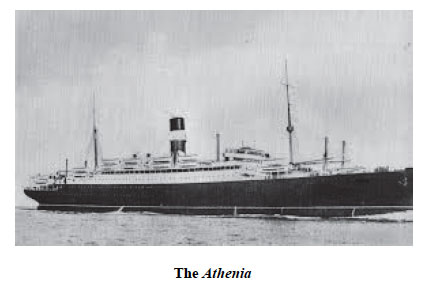
Again
3rd September 1939
Britain and France declared war on Germany on the morning of the 3rd September 1939.
That afternoon a U-boat captained by Fritz Julius Kemp fired on a passenger ship, the Athenia in the north-western sector of the Irish Sea. Despite the joint declaration of war, Hitler was still hopeful of a diplomatic resolution. He believed that he might yet be able to dissuade the Western Powers from war and to this end he issued strict orders for U-boats to follow the Prize Regulations. Under these regulations, attacks against passenger liners were prohibited, but unfortunately, the first ship that was sunk by a U-boat turned out to be a passenger liner. It caused an immediate furore in both Allied and neutral circles. It appeared that Germany was in favour of conducting unrestricted submarine warfare, as it had done during the First World War, which came so close to strangling the shipping lanes of Great Britain.

This attack signalled the first casualties of a war that would cause over eighty million deaths including forty million civilians.
Not much happened after the sinking of the Athenia. This period was dubbed the ‘Phoney War’ and refers to what happened in Western Europe between September 1939 and the spring of 1940. To assume that nothing was going on in Europe would be wrong, as Poland was in the process of being occupied, with all that brought for the Polish people. However, in Western Europe very little of military importance did take place. In fact, so little occurred that many of the children who had been evacuated at the start of the war, had returned to their families. Neville Chamberlain had declared war, but nothing seemed to be actually happening.
During the Phoney War, Britain was also engaged in ‘bombing’ raids over Germany – but it was not bombs that were dropped, but propaganda leaflets. Sir Kingsley Wood, Secretary of State for War, called them ‘truth raids’. The ‘raids’ served two purposes:
The Germans would read about the evils of Nazi Germany.
It would show the leaders of Germany just how vulnerable their country was to bombing raids.
Millions of leaflets were dropped over Germany. On 3rd September alone, 6 million copies of ‘Note to the German People’ were dropped in just one night − the equivalent of thirteen tons of paper. The main result of these initial raids was that the Germans stepped up their anti-aircraft batteries. While some politicians believed that the raids served a purpose, others in the military did not.
The English translation of the leaflet was:
Warning: A Message from Great Britain
German Men and Women: ‘The Government of the Reich have, with cold deliberation, forced war upon Great Britain. They have done so knowing that it must involve mankind in a calamity worse than that of 1914. The assurances of peaceful intentions the Fuehrer gave to you and to the world in April have proved as worthless as his words at the Sportpalast last September, when he said: ‘We have no more territorial claims to make in Europe’.
‘Never has government ordered subjects to their death with less excuse. This war is utterly unnecessary. Germany was in no way threatened or deprived of justice.
Iron censorship
Was she not allowed to re-enter the Rhineland, to achieve the Anschluss , and to take back the Sudeten Germans in peace? Neither we nor any other nation would have sought to limit her advance so long as she did not violate independent non-German peoples.
Every German ambition – just to others – might have been satisfied through friendly negotiation.’
President Roosevelt offered you both peace with honour and the prospect of prosperity. Instead, your rulers have condemned you to the massacre, miseries and privations of a war they cannot ever hope to win.
It is not us, but you they have deceived. For years their iron censorship has kept from you truths that even uncivilised peoples know.
Minds imprisoned
It has imprisoned your minds in, as it were, a concentration camp. Otherwise they would not have dared to misrepresent the combination of peaceful peoples to secure peace as hostile encirclement.
We had no enmity against you, the German people.
This censorship has also concealed from you that you have not the means to sustain protracted warfare. Despite crushing taxation, you are on the verge of bankruptcy.
Our resources and those of our Allies, in men, arms and supplies are immense. We are too strong to break by blows and we could wear you down inexorably.
You, the German people, can, if you will, insist on peace at any time. We also desire peace, and are prepared to conclude it with any peace loving Government in Germany.